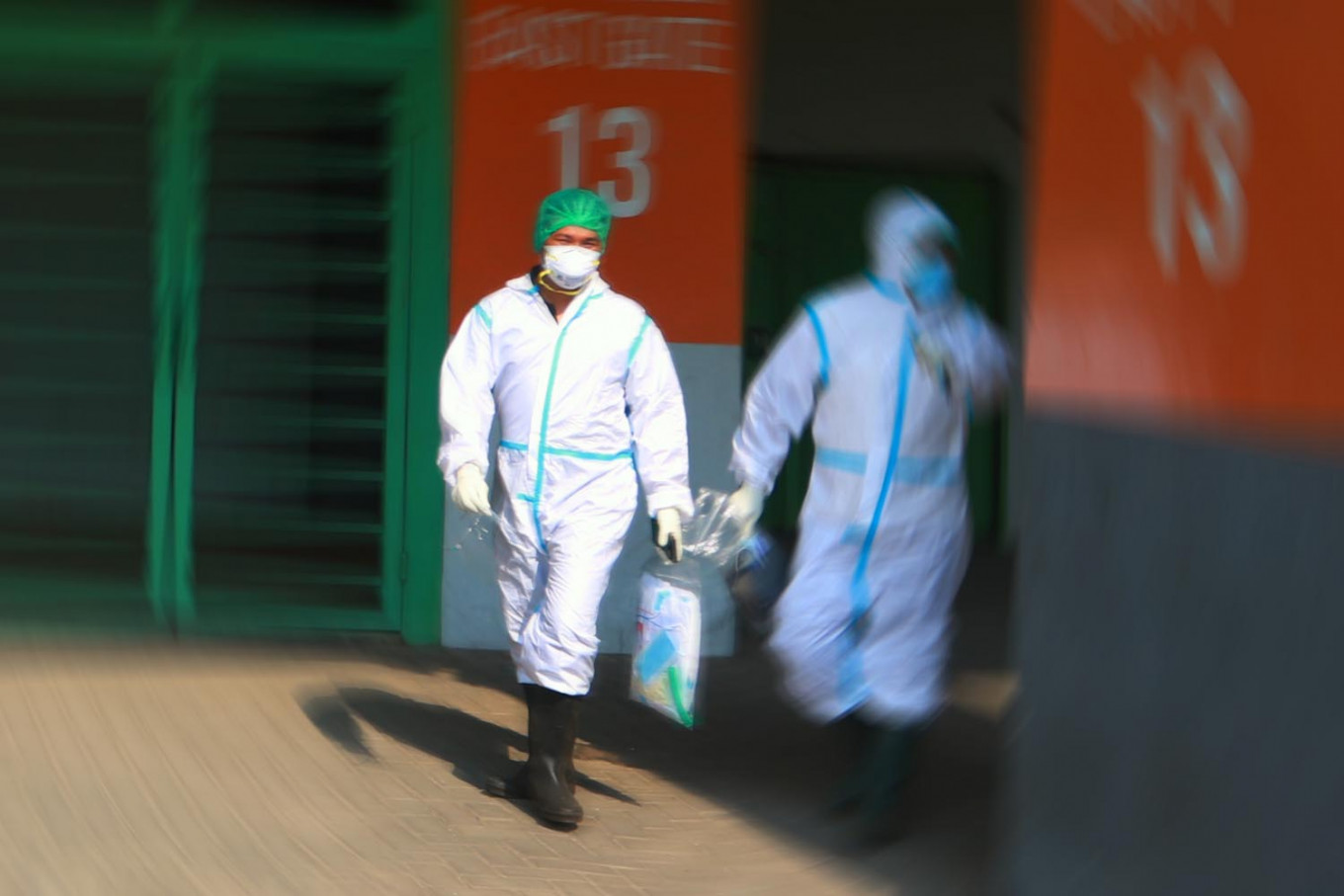Govt virus policy shifts as Omicron cases rise
Priority changes from containment to limiting hospitalizations, deaths.
Change text size
Gift Premium Articles
to Anyone

T
he government has further reduced the quarantine period for international arrivals and plans to repurpose quarantine facilities into isolation centers to ease the burden on hospitals, as authorities alter their pandemic assessment indicators amid a third wave of COVID-19 transmission.
Indonesia is experiencing a spike in infections that is largely attributable to the highly contagious Omicron strain of the coronavirus. The daily number of new recorded cases jumped from 3,000 on Jan. 24 to more than 16,000 on Tuesday, according to official data – the largest increase in over five months.
But the government has declined to impose stricter curbs, citing the relative mildness of Omicron cases, the lower hospitalization rate and progress in the national vaccination drive.
Coordinating Maritime Affairs and Investment Minister Luhut Pandjaitan told reporters on Monday that vaccinated international travelers would now be subject to five days of quarantine, down from the previous seven, while those who had only a first vaccine dose would have to quarantine for seven days.
He said the ministry had made the decision based on the Omicron variant’s incubation period of three to four days.
“This step to shorten the quarantine also takes into account the need to reallocate resources. Places previously used to quarantine travelers will now be used for centralized isolation,” Luhut said.
The minister, who oversees the pandemic response for Java and Bali, was optimistic about the country’s pandemic situation, despite predictions that transmission over the coming weeks could be three times higher than the Delta variant-fueled second wave in July of last year, which peaked at around 56,000 cases.
“Hospitalizations could surpass the Delta [wave] if our daily cases reach 150,000. But so far, our prediction is that that’s unlikely to happen,” Luhut said.
While studies have shown that the Omicron variant is more transmissible than its predecessors, it also appears less virulent. Only a handful of the country’s Omicron patients have shown severe symptoms.
Of the 1,988 Omicron cases reported by the Health Ministry on Thursday, just 854 patients had been hospitalized, and more than 90 percent were either asymptomatic or showed mild symptoms.
According to government data, only three people have died of the Omicron strain.
But even though the variant is perceived to be less severe on average, World Health Organization director-general Tedros Adhanom Ghebreyesus said on Jan. 18, “The narrative that it is [a] mild disease is misleading, hurts the overall response and costs more lives.”
“Make no mistake, Omicron is causing hospitalizations and deaths, and even the less severe cases are inundating health facilities,” the WHO chief said.
On Tuesday, the national COVID-19 task force recorded 16,021 new cases and 28 deaths, although the data did not show which cases were of the Omicron variant.
Jakarta, which remains the epicenter of the current outbreak, has retained level 2 public activity restrictions (PPKM), alongside its satellite cities and the majority of other regencies and cities across Java and Bali, according to a Home Ministry instruction issued on Monday.
Read also: COVID-19 third wave takes hold in Jakarta
Switching focus
Earlier on Monday, President Joko “Jokowi” Widodo called on his Cabinet to take “a different approach” to the Omicron spike, pointing out the need to focus on “downstream mitigation efforts” in the short term.
“We have to raise awareness and inform asymptomatic patients to self-isolate at home and get themselves checked at local community health centers, other facilities or through telemedicine. We also have to guarantee the availability of treatment drugs at pharmacies,” Jokowi said at a weekly Cabinet meeting by video link from East Kalimantan.
He also underlined the importance of preventing widespread local transmission, ensuring vigilance at entry points and maintaining proper quarantine procedures, as well as fast-tracking vaccination.
Separately, Luhut said the government would shift its focus away from containing the virus and toward limiting hospitalization and death rates. The hospitalization rate, therefore, would become a more central factor in determining the PPKM level.
Riris Andono Ahmad, an epidemiologist at Gadjah Mada University in Yogyakarta, said the greater focus on hospitalization rates could be effective.
“With the current state of our vaccination efforts, we can assume that the pressure from Omicron transmission on the healthcare system won’t be as high as with Delta,” he told The Jakarta Post on Tuesday.
“Now the question becomes: Will the Omicron wave result in more absolute hospitalizations than Delta?”
According to government data, as of Tuesday, more than 60 percent of the nation’s target population of 128.65 million had received two COVID-19 vaccine doses, although less than half of the targeted elderly population of 10.4 million had been fully inoculated.
-- Eisya A. Eloksari contributed to this article.









